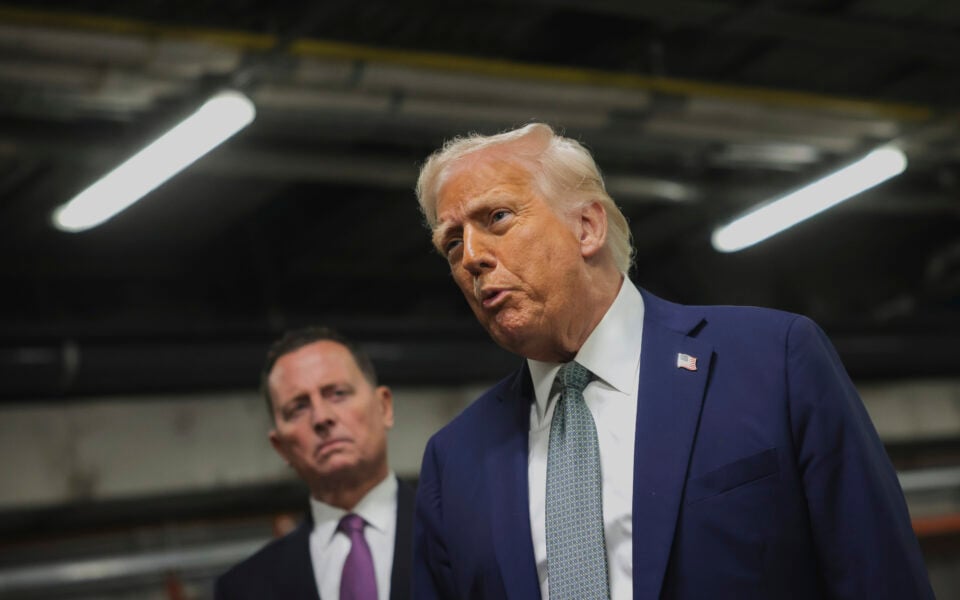A US initiative aimed at bringing Greece and Turkey to the negotiating table is being discussed behind closed doors, according to exclusive information obtained by Kathimerini. Although the proposed plan is still in the preliminary stages, it raises a series of questions and appears to entail some problematic elements, particularly at the present juncture, where Turkey seems to be significantly strengthened. Its implementation is expected to follow the confirmation of the new US ambassador to Greece, Kimberly Guilfoyle, and her arrival in Athens.
The core elements of the initiative have been outlined to interlocutors in Washington by President Donald Trump’s envoy for special missions, Richard Grenell, though he has not gone into detail regarding its implementation. According to Kathimerini’s sources, he has already discussed the plan with US Ambassador to Turkey Tom Barrack and Guilfoyle.
Both Barrack and Guilfoyle are said to have responded positively to the idea in principle, viewing the current climate of relative de-escalation as an opportunity to explore the possibility of a more structured dialogue between Athens and Ankara. According to the same sources, both diplomats believe that such a development, if it ultimately takes shape, could produce tangible results and contribute to a more stable environment of reduced tensions between the two countries.
While the exact scope of potential discussions has yet to be defined, early thinking reportedly includes the launch of a process that could ultimately lead to international arbitration on maritime zones.
It is not currently clear whether, and to what extent, Ankara has been formally briefed on the plan. However, given that Ambassador Barrack is reportedly aware of the plan, it is reasonable to assume that the Turkish side has been informed.
Also given Ambassador Barrack’s demonstrated diplomatic activity since taking office, particularly in advancing Turkish interests, his involvement in any such initiative would likely tilt the balance in Ankara’s favor, in a manner that would be highly problematic for Greek positions.
It is worth recalling that Grenell, who served as acting director of national intelligence and US ambassador to Germany during Trump’s first term, had sought the post of secretary of state before it was ultimately given to Marco Rubio. Notably, he maintains a strong personal relationship with Turkish Foreign Minister Hakan Fidan. The Grenell-Fidan-Barrack triangle represents, without question, a powerful axis of influence.
According to sources speaking to Kathimerini, the proposed initiative forms part of a broader effort by officials close to President Trump to promote a more active US role in resolving longstanding disputes and to advance a new model of American mediation, one based more on personal relationships and behind-the-scenes diplomacy.
According to information, the initiative has not been brought to the attention of Congress, nor has it been raised publicly or behind closed doors during the confirmation processes for either Barrack or Guilfoyle. Nor, moreover, has any briefing been made to Athens, a development that is being attributed to the current absence of a US ambassador in Greece.
In today’s Washington, where the president’s view is decisive and the only one that really counts, and where foreign policy is increasingly shaped by personal connections, the fact that Guilfoyle has not yet assumed her post is far from good for Greece.
Sources indicate that her arrival is unlikely before the fall, as the bureaucratic procedures required to schedule her Senate hearing have not yet been completed. These include a thorough vetting that examines criminal records, financial disclosures and credit history to assess the nominee’s integrity, ethical standards and overall suitability. This process applies to all the nominees, with no exception.
Before Guilfoyle, Joshua Huck, currently deputy assistant secretary of state for European affairs, is expected to arrive in Greece by the end of June to assume the role of deputy chief of mission, effectively becoming the second-ranking official at the US Embassy. Huck is a highly experienced diplomat with a strong understanding and deep knowledge of Greek affairs and of the broader region in general.
While his arrival is a highly positive development for Greece, it will leave a key post at the State Department vacant. Combined with the absence of an assistant secretary of state for European affairs, this creates, for the time being, a significant gap in the consistent and detailed monitoring and promotion of issues related to Greece.
Given this transitional period at the State Department, even preliminary discussions of the initiative for Greece and Turkey create conditions that do not favor its thorough and effective evaluation, let alone its sound and beneficial implementation. Moreover, the effort to advance this initiative is expected to trigger strong reactions from the Greek-American lobby, which the US administration will likely take into account ahead of the midterm elections.
